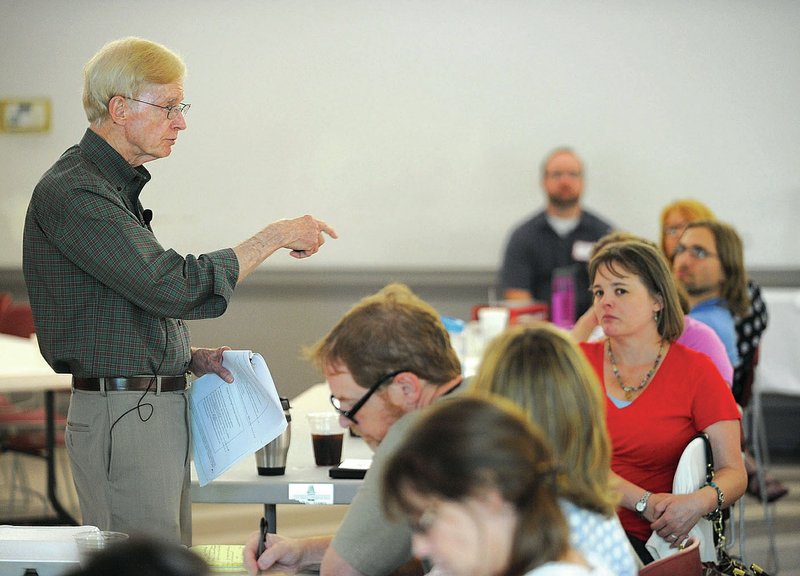A new program at the University of Arkansas is beginning to train students and professionals on a counseling therapy for children that focuses on play.
The Office of Play Therapy Research and Training became an approved training center for the National Association for Play Therapy in March and organized a two-day workshop that began Friday with a pioneer in the field, Garry Landreth.
Training
Attitudes taught in Child-Parent-Relationship training
• I am here
• I hear you
• I understand
• I care
Source: From Child Parent Relationship Therapy Treatment Manual by Sue Bratton, Garry Landreth, Theresa Kellam and Sandra Blackard
Landreth is a regents professor emeritus from the University of North Texas, where he founded the Center for Play Therapy. He contributed to the development of a 10-session model for counselors to use in teaching parents to strengthen relationships with their children.
"Parents need hope," Landreth said. "Parenting is a troublesome, hard, fraught-with-guilt task. Parents need somebody in our society who believes in them."
The University of Arkansas office will offer its first course in play therapy in summer, said Kristi Perryman, a registered play therapist supervisor who is the director of the office. She is an assistant professor of counselor education.
Perryman is working to develop more courses in child-centered play therapy and eventually hopes to offer play therapy services for the community. The office also will promote more play therapy research.
When adults experience difficulties, they talk about it with spouses, friends or therapists, Perryman said. During a situation such as a divorce or a death in the family, children -- especially between age 2 and 10 -- often will convey their feelings through play, she said.
"Play is their language, and toys are their words," Perryman said.
The workshop this weekend focused on enabling mental health professionals and students entering the field to teach parents skills to use with their children at home, Perryman said.
The model Landreth taught is designed for counselors to meet with groups of parents once a week for a 10-week period. Parents receive homework each week and are asked to devote 30 minutes each week to a home play session.
The program helps parents focus on the person their child is rather than the problems the child has, Landreth said. That focus helps parents to have hope for their children instead of disappointment.
"It's communicating a belief in the child," he said. "Children tend to internalize what the parent believes about them."
Parents learn phrases to build their children's confidence. They also learn the difference between praising their children and encouraging them, Landreth said. Praise is natural, but it is used to reinforce behaviors expected from the child. Praise leads to extrinsic motivation, he said.
Parents can help their children become more internally motivated with support and encouragement that prizes what the child is capable of as a person, he said.
Perryman's favorite activity in the therapy is named "30-second bursts of attention," she said. Parents are taught to find opportunities to give 30 seconds of attention to their children without any other distractions, she said.
When a child asks for their parent's attention, rather than putting them off, the parent stops, gets on the child's level and listens, Perryman said. That attention makes children feel valued and helps them feel confident.
Marie Gateley of Fayetteville said the model provides her with a framework she can adapt for use with parents with elementary children she sees. She is a school-based therapist with Ozark Guidance.
"I always want my parents to leave with skills," she said during a workshop discussion. "While this doesn't come from a more solution-focused place, it really does meet that need. By focusing on the relationship as it is today, you're still meeting that need."
Landreth said parents can recover from mistakes. Children can get through the most difficult circumstances.
"We can provide hope that things can be better," he said.
NW News on 06/15/2015


